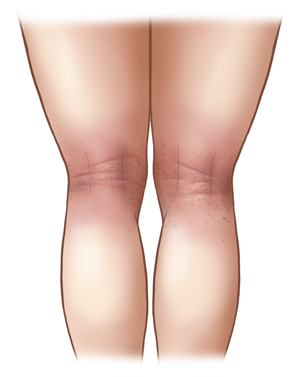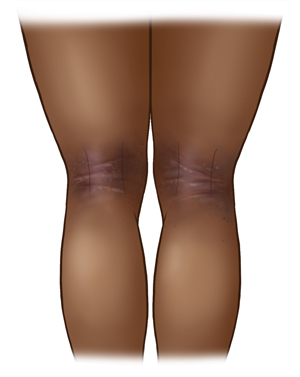What Is Atopic Dermatitis?
Atopic dermatitis (eczema) causes chronic skin irritation. This condition can affect people of all ages. It often runs in families. (This means it can be genetic). It may also be linked to allergies, such as hay fever and sometimes asthma. Patches of skin become dry, red, itchy, and scaly. Sometimes atopic dermatitis is only on the hands or feet. It often improves when the skin is well hydrated. It gets worse when the skin is dry. You can help control symptoms by practicing good self-care. Stay away from anything that causes flare-ups, such as sunburn or vigorous scratching.
Where do you have symptoms?
Atopic dermatitis symptoms can appear anywhere on the body. But in most cases, they vary based on the person’s age. In babies, irritation is often seen on the scalp, cheeks, chin, near the mouth, and under the eyelids. In children ages 2 through 10, skin folds, such as the backs of the knees or in the arm crease, are most often affected. In children 11 and older and in adults, symptoms can affect many areas.
 |
| Eczema on light skin. |
 |
| Eczema on dark skin. |
What triggers symptoms?
Symptoms flare because of many things. These include skin dryness, scratching, stress, harsh soaps, and irritants, such as dust or wool. Try to stay away from anything that causes flare-ups.
Recognizing what causes flare-ups
To figure out what causes atopic dermatitis to flare, keep a list of things that seem to irritate your skin. Start by filling in the spaces below. Then keep writing them down in a notebook or diary. The things that affect each person vary. So, keep your own list and try to stay away from your triggers.

Online Medical Reviewer:
L Renee Watson MSN RN
Online Medical Reviewer:
Marianne Fraser MSN RN
Online Medical Reviewer:
Michael Lehrer MD
Date Last Reviewed:
3/1/2022
© 2000-2025 The StayWell Company, LLC. All rights reserved. This information is not intended as a substitute for professional medical care. Always follow your healthcare professional's instructions.